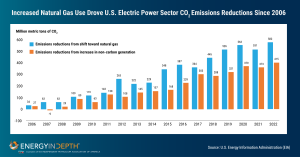For 17 consecutive years, natural gas has been the driving force in reducing U.S. power sector carbon dioxide emissions, new Energy Information Administration data show, making almost double the impact when compared to renewable power generation.
This data is especially relevant as COP28 kicks off this week with activist attempts to dismiss the role of natural gas in the energy future. It is increasingly apparent that the trend of increased usage of natural gas is key in meeting global energy emission reduction ambitions.
Emission Reductions
Natural gas operators across the United States are supplying the essential energy needed to power people’s everyday lives, all while reducing greenhouse gas emissions.
The EIA’s latest “U.S. Energy-Related C02 Emissions, 2022” report detailed the change in CO2 emissions, demonstrating that the increased use of natural gas has been spearheading emissions reductions across the U.S. power sector since 2006.

Compared to coal, natural gas emits approximately 50 percent less carbon dioxide during combustion. In 2022 alone, the shift to natural gas provided an emissions reduction of 582 million metric tons of CO2 (MMT CO2). That’s the emissions equivalent of 156 coal-fired power plants operating for a year, according to EPA’s Greenhouse Gas Equivalency Calculator.
Similarly, in comparison to non-carbon generating forms of power, natural gas slashed emissions by 167 MMT CO2 more than other non-carbon fuel sources in 2022 alone.

In the long-term, the benefits of switching to natural gas power generation are increasingly apparent. Since 2005 the increased use of natural gas for power generation has led to emissions reductions of 4,989 MMT CO2. And, when compared to non-carbon generating power sources, natural gas emissions have been reduced by almost double, or 1,782 MMT CO2e.
As natural gas production scales to meet increased demand, the environmental impacts of electricity generation will continue to decrease—marking a substantial step forward in the United States’ commitment to mitigating CO2 emissions.

Bottom Line: Natural gas continues to outpace renewables in making tangible reductions in greenhouse gas emissions. The versatility and sustainability of natural gas will remain crucial across the energy value chain, especially as the domestic and global energy market continues to evolve.